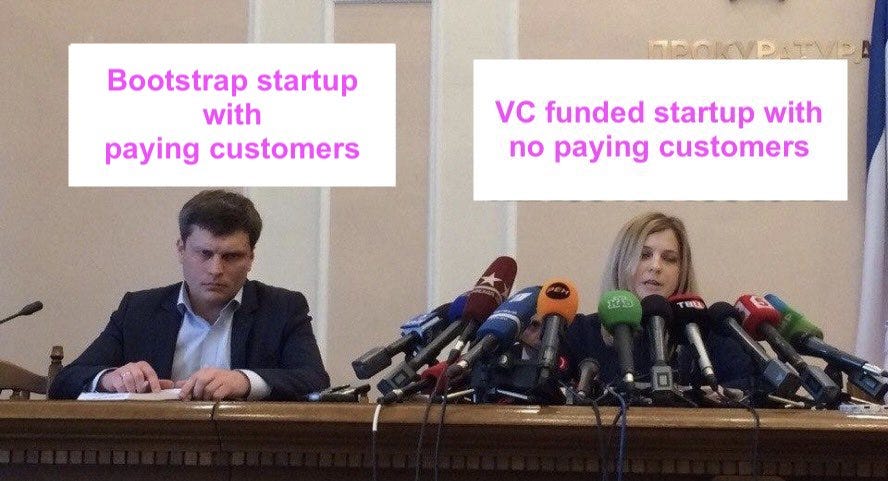Transmission #4: Don't know the unknown 💡
Why de-risking is the winner move for every situation and tech for beginners
Read Time: 5.50 Minutes
This is a ‘Transmission’ from the Jupiter Dispatch, featuring curated links and stories to provide you with new ideas, growth tactics, and frameworks tailored for european entrepreneurs.
Servus Friend,
In today’s ‘Transmission’ we’ll try to bring some light into the unknowns of risk and tech jargon. For most of us boring topics, but extremely helpful to score a great career.
So let’s face the unknown togehter… 🔦
Today’s List of Stuff:
⚠️ How de-risking helps you to move fast, even without funding 🏎️
🆘 Tech for beginners and people who hate coding 👩💻
#Domi's favourite 5 - Random Don’t Know Edition ❔
#1 ⚠️ How de-risking helps you to move fast, even without funding 🏎️
If you think about startup founders, you also think about a group of people with a high connection to risk. No secure salary, no secure job. They don’t care.
But in terms of risk and how to avoid it, separates the good founders from the great founders.
Because being able to facing high risk situations, don’t mean you have to take this for granted. Great founders reduce risk where they can. So de-risking is a major skill to increase the odds of success.
But how approach a confusing situation with all sorts of risks involved.
Introducing the “Onion Method of De-Risking”, by Andy Rachleff.
Here is essence of it:
If you starting a startup or leading a project/business, you are facing many layers of risk. Like an onion. (to get the full explanation read on here)
Market risk
Competition risk
Timing risk
Financing risk
Marketing risk
Distribution risk
Technology risk
…
You get the point. And this is scary for everyone of us.
But great founders peal off every layer of risk, like pealing an onion. So you have to acknowledge the risk one by one, but in the same time you look out for solutions how to “de-risk” these parts.
This way you automatically find your strategy, and if you looking for funding by investors generate a sufficient pitch for them.
So risk is your friend, which is pointing you to the right problems to invest your time.
The following clip of famous A16Z-Partner Marc Andreessen is a perfect example in how you should approach risk… (less than 2 mins)
That’s contrarian thinking at its core. The perception is usually that founders are don’t care about risk, otherwise they wouldn’t found a company.
But the best founders “hug” the risks and solve them to form moats against their competition.
#2 🆘 Tech for beginners and people who hate coding 👩💻
Being a business major myself, there is always one thing I struggle the most with…
Understanding technology and what these tech nerds talking about all the time. But even with the dawn of AI coming up, it is still important even as a business guy to understand the main concepts of IT and the alike.
This is the only way to be able to see the opportunities in new markets, that tech nerds can’t, because they trained in solving technical problems, not market demands.
Therefore the infamous Lenny’s Newsletter is helping us out, here is a short but effective guide to get into tech concepts…
This is just for the start, but understanding in basic terms how modern tech stacks and APIs work, is crucial also for non-tech people.
I am thinking of writing a guide for tech concepts non-techies have to know, in the future. If you a fan of this idea, please tell me in the comment section. 👇
#Domi’s favourite 5 - Random Don’t Know Edition ❔
Here are my most interesting Reads and Vids of the last Weeks:
HackerNews: What are the best articles on managing people? (Resources)
WaitButWhy: How to pick a career (that actually fits you)
Feedback please! Help your favourite Domi to make all of this even better…
Click on a link to vote or use the comment section below:
The truth is, there are many people out there, being secretly rich 😉
Please share the Jupiter Dispatch with a friend you want to impress and help me to grow.
Have an epic time, see you soon for the next Transmission…
👋







